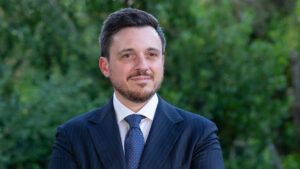posted 11 months ago
Author


There are no results matching your search.
ResetI joined ONTIER in 2021 as a Partner to lead the Real Estate department. Over more than 20 years of experience within law firms of primary importance, I have consolidated a deep knowledge of the legal issues and market dynamics related to real estate and construction, working for major domestic and international operators in major transactions and across all asset classes.
Among other matters, I assisted clients in dismissals and acquisitions of real estate portfolios, sale and lease back, developments or regeneration of areas and building complexes, works and service contracts, social housing initiatives, procedures for the dismissal of public buildings, as well as in the privatisation of the economic exploitation of commercial spaces, media & advertising spaces of the main Italian railway stations.
I also developed a specific interest towards the industry of proptech, looking into the legal and business demands of those operators – ranging from startups to bigger players – that integrate technology with real estate in all classes, such as smart real estate, contech, sharing economy and real estate fintech. My field also encompasses matters of corporate and commercial law, corporate governance, corporate finance, mergers and acquisitions, co-investment agreements and other main business and financial agreements.
I am licensed as a lawyer (avvocato) in Italy and am a member of the Urban Land Institute (ULI), the Global Real Estate Group at the London School of Economics (LSE GREG), the Italian Proptech Network (IPN) and the Associazione Italiana Giuristi Diritto Immobiliare (AGIDI).
My mother tongue is Italian, and I fluently speak English, Spanish and French.
When assisting clients in domestic or international transactions, my hallmark is that I do my best in meeting not only the legal but also, and above all, the business needs of clients. In this, I think that real estate specialists must necessarily master a specific knowledge of the various asset classes, of the market and of its dynamics and trends, along with legal knowledge spanning various fields, such as civil, administrative, corporate, financial, capital markets and tax, etc.
In an increasingly globalised world, the provision of legal services has also long since transcended national borders, and so business lawyers operate more and more in a single global market. At ONTIER, the care for the transnational aspects of legal advice is one of our firmest pillars. The world is global, the business is global and so are our services. As such, we see ourselves as a single firm, and in fact we are – with all our lawyers cooperating between all offices, spread across different countries and continents. In real estate too, we have set up a multi-country team through which we share expertise and know-how to always offer a highly satisfactory service to our international clients.
Nowadays, I think one of the biggest challenges in real estate concerns the world of construction, and therefore real estate developments. Against a backdrop of rising inflation, shortages of raw materials and labour, concerns over energy sources and general uncertainty projected by the ongoing conflict in Ukraine, one of the toughest challenges concerns the contractual relationships between principals and contractors with reference to, for example, closed-price contracts and the related aspects of budget deviations, price revisions, work suspensions, material procurement, hardship and force majeure clauses, etc.
Financing matters, with reference to both acquisitions and developments, are also a point of focus in today’s times.
Several topics are on the table today, after the world has changed in the last three years; above all, the office of tomorrow – a topic that involves the new use of office premises. How will the office be adapted in a post-pandemic world? Contrary to what some may have thought during the pandemic, the office is far from finished. On the contrary, it has been reinvigorated in its capacity as a catalyst for interpersonal exchanges of human and professional energies. And indeed, the investment trend in this asset class is positive.
The second theme is relocation. Some countries are highly centralised, and in Italy, the main cities – such as Milan, and much less Rome – have historically attracted the majority of international investment to Italy. Today, Rome is more prominent in investors’ sights, both for office and housing use, as well as for hospitality. Moreover, during and after the height of the COVID-19 pandemic, a process of relocation to second cities has taken place.
COVID has also changed our demands in terms of housing, an asset class that investors like more and more. The supply of houses must be adapted to new uses, which are increasingly hybrid (smart offices, co-housing, senior housing, student housing, etc), and to social classes and generations that are abandoning the idea of ownership, a value that is no longer essential, and are considering rent, especially if serviced, as a preferrable choice.
Finally, it is worth mentioning the hospitality sector. After the restrictions on tourism during the pandemic, people from all over the world have finally rediscovered the pleasure of travelling, and many choose Italy for its heritage of artistic and natural beauty. Owing also to some incentive measures, hotels are renovating their premises. In addition, the attractiveness of the Italian hotel industry has recently been confirmed, and at the same time boosted, by the entry of many prestigious international luxury hotel brands in various Italian cities.
Of those mentioned, one of the most promising areas now seems to me to be the regeneration of areas and building complexes. The theme of urban regeneration is at the centre of national but also international policies, and I particularly refer to the EU Recovery Plan and the Italian plan known as the PNRR. Not only are already viable urban areas being redeveloped, but also abandoned or disused spaces are being restored to the urban fabric and integrated with these through the widest mix of uses. Among these, I was recently involved in an interesting deal where my client – an international university of fashion based in Florence – was the pivotal tenant of “built to suit” spaces within the revitalisation of the old tobacco factory, which had been active for more than 70 years before its closure in 2001. The ambitious regeneration project aimed to bring a new district of the city to life, giving it the creative energy of fashion, art and design, complementing the historic city centre, open to all and connected to the wider world. Its masterplan provided for a functional mix, where the original and newly constructed buildings will host schools, ateliers and laboratories, office and coworking spaces, studio apartments, housing, a hotel, halls of residence and a brewery.
Another fascinating example of regeneration and recovery policies is the one concerning the former railway yards (ex scali ferroviari).
And speaking of railways, a few years ago I was involved in a very complex job concerning the privatisation of the economic exploitation of commercial, media & advertising spaces of the main Italian railway stations. It was an unforgettable experience, not only because of the complexity of the legal aspects involved, especially under the corporate and administrative profile, but also due to the distinctiveness of the object. With this operation, it was in fact going to enhance the performance of commercial and advertising services for the benefit of users who passed through the stations, as well as of the cities, which thus found a new focal point and meeting place in perennially central locations.
Continuing professional development is of paramount importance to the legal profession, and even more so when working internationally. As mentioned above, clients’ industries, and not only the legal aspects, constitute the focus of our continuous learning and exchange of expertise. To this end, at ONTIER, our way of working as a global firm – through multinational teams – is of course beneficial in the first instance. In addition, we are consistently active in building international relationships, and I make sure to participate in the major global real estate industry events.
More Locations
Main Guide
posted 2 years ago
Real Estate Law encompasses landowners’ transactions and shares common ground with Property Law – and the myriad ways in which land and property are utilised for personal and business endeavours…
There are no results matching your search.
Resetposted 1 year ago
Commercial or mercantile law relates to the interactions, rights and conduct of individuals or businesses engaged in trade and commerce…
posted 2 years ago
Real Estate Law encompasses landowners’ transactions and shares common ground with Property Law – and the myriad ways in which land and property are utilised for personal and business endeavours…
posted 2 years ago
Business crime is a broad term that includes a wide scope of nonviolent criminal offences relating to fraud and illegal financial transactions, often achieved by sophisticated means…
posted 2 years ago
Employment Law governs interactions between employers, employees, unions and government regulations – which often require amendments due to societal changes…
There are no results matching your search.
ResetSign up for the latest advisory briefings and news within Global Advisory Experts’ community, as well as a whole host of features, editorial and conference updates direct to your email inbox.
Naturally you can unsubscribe at any time.
Global Advisory Experts is dedicated to providing exceptional advisory services to clients around the world. With a vast network of highly skilled and experienced advisers, we are committed to delivering innovative and tailored solutions to meet the diverse needs of our clients in various jurisdictions.